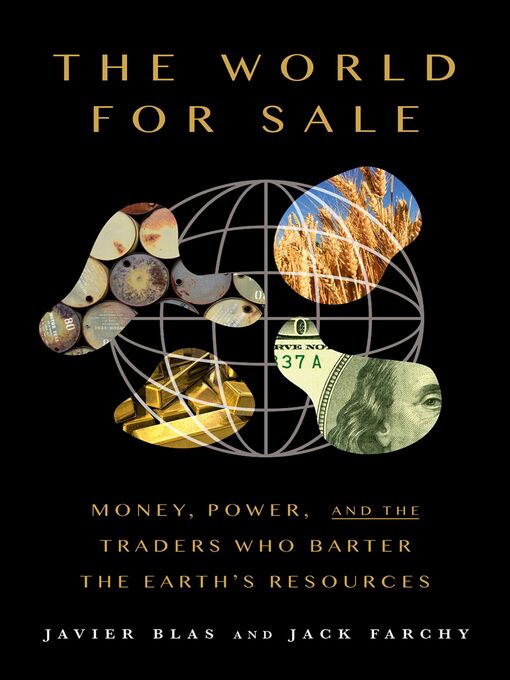The World for Sale
Money, Power, and the Traders Who Barter the Earth's Resources
-
Creators
-
Publisher
-
Release date
March 1, 2021 -
Formats
-
Kindle Book
-
OverDrive Read
- ISBN: 9780190078973
-
EPUB ebook
- ISBN: 9780190078973
- File size: 1377 KB
-
-
Languages
- English
-
Reviews
-
Publisher's Weekly
January 25, 2021
Bloomberg News journalists Blas and Farchy debut with a colorful and alarming exposé of the shadowy world of global commodity trading. Willing to go “where others fear to set foot” in order to barter the essential staples of the world (grain, oil, minerals), some commodity traders are impervious to politics, patriotism, or principles, according to the authors. They describe the chief executive of “the world’s largest oil-trading company” landing in Benghazi during the Libyan civil war to do a deal with Libyan rebels, detail how a Marc Rich + Co employee pretended to be a representative of Burundi in order to buy oil at a discount, and note that traders who violated sanctions in order to do business with South Africa in the 1980s helped to sustain and prolong apartheid. Blas and Farchy also detail how the U.S. Justice Department under attorney general Eric Holder aggressively prosecuted and curtailed the activities of rogue traders. Hair-raising anecdotes about “swashbuckling” traders “walking on the edge of the knife” keep the pages turning, but Blas and Farchy sometimes get caught between glamorizing their subjects and condemning their actions. Still, this an engrossing look at an obscure yet consequential corner of the financial world. -
Kirkus
January 15, 2021
Behind-the-scenes look at the world of commodity traders, "essential cogs in the modern economy." The work of commodity traders, write financial journalists Blas and Farchy, is shadowy--and the traders prefer it that way. The authors open their anecdotally rich narrative with the role of one firm in supplying oil to rebels against the regime of Muammar Qaddafi. "Without $1 billion of fuel in their moment of need, the rebels would have certainly been defeated," they write, adding that the incident was far from isolated in the history of oil trading in the region. That Libya later descended into civil war gave a moment for pause before the traders went on to their next task. As Blas and Farchy note, if anyone represents Adam Smith's vaunted "invisible hand," it is those brokers who move goods around the world. Without them, the authors hold, the global economy would grind to a halt; thus, it's interesting that so essential an activity would be so little chronicled, making news "when prices surge or when scandals break." Some traders have become mega-wealthy in the bargain while others occasionally have to take a bath. It's a long game of risk and reward that sometimes plays out in surprising ways. In the authors' telling, the oil market during the pandemic has been so topsy-turvy that some oil producers have actually paid traders to take oil off their hands, with the traders storing it until prices begin to return to something approaching normal. What makes the system work is credit, "the lifeblood of commodity trading," which itself entails no small amount of risk. Some companies and traders fail while some succeed beyond all expectation, as with Glencore, which is "no longer just the world's largest trader of commodities, but also one of the largest producers of natural resources on the planet." A highly readable study in world economics and a valuable primer for would-be oil barons.COPYRIGHT(2021) Kirkus Reviews, ALL RIGHTS RESERVED.
-
Formats
- Kindle Book
- OverDrive Read
- EPUB ebook
subjects
Languages
- English
Loading
Why is availability limited?
×Availability can change throughout the month based on the library's budget. You can still place a hold on the title, and your hold will be automatically filled as soon as the title is available again.
The Kindle Book format for this title is not supported on:
×Read-along ebook
×The OverDrive Read format of this ebook has professional narration that plays while you read in your browser. Learn more here.


